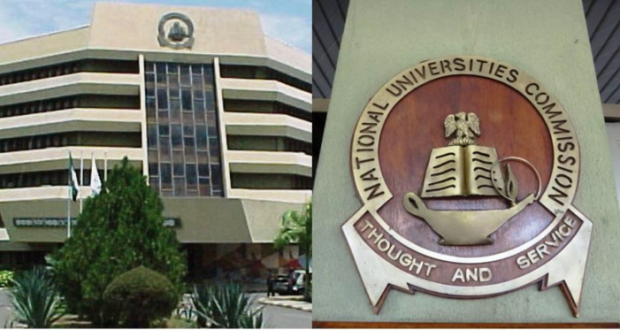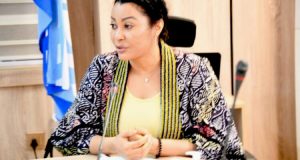…NUC disagrees, says students only pay maintenance fees
…FG relinquishing its role in building society – ASUU
…NANS worried student dropout on the increase
While the federal government is yet to officially announce a policy change, the reality is beginning to dawn on Nigerians that public universities are no longer tuition-free and have not been for some time despite the narrative that they are.
Investigations by LEADERSHIP Weekend revealed that virtually all federal universities charge students a wide range of fees and are, in fact, beginning to raise the different categories of fees by close to 200 percent.
In the Federal University of Lafia, Nasarawa, for instance, the charges include Medical examination, Identity card, SUG dues, Students handbook, Caution, Examination library, Sanitation, ICT, Sports/games, Result verification/issuance, Municipal services, and Lab/studio/workshop, Teaching practice/field trip/SIWES/project.
The University of Lagos, which has similar charges, has more than 62,000 students, indicating it generates billions of naira each semester. While the National Association of Nigerians Students (NANS) has claimed tuition fees have consistently led to a high drop out of students from public universities, there are no verifiable records of the number of students who drop out each year due to the inability to pay the fees.
And in spite of the soaring cost of getting a university education, the National Universities Commission (NUC) has insisted that federal universities remain tuition-free and in what amounts to double speak, says the commission might consider regulating fees in universities.
But it is not only the NUC that is in denial about the existence of a tuition-free tertiary education policy by the federal government; so is the Academic Staff Union of Universities (ASUU), which for their own reasons are holding on to the notion that students don’t pay for their degrees and the university system is solely funded by the government.
In the 2023 budget of the federal government, N1.79 trillion was set aside for the education sector, out of which N470 billion was tied to tertiary institutions. Another N248.3 billion was allocated to the Tertiary Education Trust Fund (TETFund).
But through publicly available data, LEADERSHIP Weekend was able to ascertain that the universities themselves raise just as much in revenue, which they rarely account for. The University of Lagos, for instance, has a total population of 62, 215, according to the 2019/2020 statistics. 35,436 students are undergoing full time undergraduate programs, 57 percent of the total number.
2,532 are in Distance Learning Institute (DLI), 9046 pursuing Post Graduate Degrees, 2,797 students in the Institute of Continuous Education (ICE), and 2,404 in the sub-degree (Pre-degree program)
UNILAG has 12 faculties, 6 institutes and 26 centers. According to the 2019/2020 Enrollment, the Faculty of Education has the highest number of students, 7,046, while the Faculty of Basic Medical Science (BMS) has the least number, 397 students.
According to the figure by the bursary department of University of Lagos, new fulltime undergraduate students in both science and non-science faculties pay the same fees, a total of N64,500 for the first semester they are enrolled in.
The breakdown is as follows for the new students: Acceptance fee, N20,000; Registration, N5000; ID Card N1000; Results Verification, N5000; Examination, N5000; Medical Services (including drug test), N5,000; Library Services, N5000; Information Technology, N2500; Endowment fund, N10000; TISHIP, N5000, and Sports, N1000.
Speaking on the possibility of the government ending its funding of public universities, immediate past chairman of ASUU, UNILAG chapter, Dr Dele Ashiru, knocked the federal government over its decision on education loan, charging it not to be passive in educating its citizens.
Ashiru said the education loan plan is a half-hearted response to tackling the funding challenges of education in Nigeria, just as he tasked the federal government to look at the model of Scandinavian countries who made education free because of its importance and ripple effect. He said Nigeria has the funds to educate its citizens, adding that members of the legislature are not up to 1000 but “look at the huge funds they consume as salaries and allowances.”
The scholar from the Department of Political Science said the government initiative “is a long attempt in taking education out of the reach of the masses in Nigeria. “Education is one of the pillars that build society. The government must not take a passive attempt in tackling education issues,” he added. The government on its part is still saying tertiary education is free.
In an exclusive interview with LEADERSHIP Weekend, the acting director, Directorate of Public Affairs, of the NUC, Mallam Haruna Lawal Ajo said the federal government currently does not charge tuition fees for students. He, however, said the government may decide to regulate fees in Universities, in consultation with stakeholders if the need arises.
“First, NUC does not regulate fees in Nigerian universities. The federal government could do so after consultations with stakeholders in the prevailing circumstances. Secondly, all federal universities remain tuition-free until the government in its wisdom decides to review the policy,” he noted.
Also, a staff in the Federal Ministry of Education, who spoke on condition of anonymity, said the federal government does not determine fees in federal universities across the country. The recent increase in the fees charged by the universities is however what has brought to light the reality that higher education in Nigeria is no longer free.
At the University of Abuja, the management announced an upward increase in the fees. The vice-chancellor, Prof Rasheed Na’Allah, explained that a committee had been working on the fee review for nearly a year, taking into account the rising inflation and comparing fees with other federal universities.
He said, “Faculty deans and department heads presented their proposals, aiming to provide practical experiences and necessary resources for their academic programmes.” However, it was gathered that the increased fees at the University of Abuja ranges from N82,000 per year for arts programmes to N225,000 per session for medicine. Meanwhile, the National Association of Nigerian Students (NANS) has called for reduction in school fees.
Speaking with our correspondent, the coordinator, NANS North Central zone, Shedrack Anzaku, said the rate of students dropping out is increasing due to school fees’ hike. He said that the association has already written to the NUC, asking it to prevail on tertiary institutions to reduce school fees.
“What the association expects is school fees reduction and not increment because the rate of dropout is increasing. We frown against all forms of school fees increasing at a time like this when there are numerous hardships across the country,” he stated. In the University of Maiduguri, Borno State, the increase is taking a toll on the students, as well as parents, with many students withdrawing from school over their inability to bear the cost.
According to a source in the University of Maiduguri, the institution which has about 75,000 students admitted about 11000 students in the last academic year, but with the increment of the tuition fees by 200 percent, the University only admitted 7000 students in the current admission year.
Some students, he said, sought their admission with state universities in Borno and other parts of North East that are fast growing with lesser school fees. The current lowest registration fee now at the university is N53,000 while the highest, which is that of the Medical College, is N238,000.
Meanwhile, parents and students have decried the increase in the registration fees and charges for the 2022/2023 academic season by the authorities of the University of Maiduguri. The university’s governing council recently announced an upward review of fees for the academic season. Registration fees for undergraduate students in the faculties of Arts and Social Sciences were increased from N25,000 and N28,000 to about N100,000.
For instance, prior to the increment, students of faculty of Law were paying not more than N35,000 per session, but with the 200 percent hike, part 1 and 2 of the faculty of law now cough out over N130,000 while those in 400 and 500 level pay about N103,000 as tuition fees.
Parts 1 and 2 new medical students (MBBS) in the College of Medical Sciences will now pay N252,500, while returning students in higher classes, will pay N233,000 as against below N100,000 previously charged .
The new fees also require Medical Laboratory Science/Nursing new students to pay N136,500. Returning students in the same departments will now pay N117,000, while new students in the departments of Anatomy and Physiology are to pay N162,500, and returning students are to pay N143,000.
The Borno Emirate Council and opinion leaders, including parents and students’ body, appealed to the management of the University for a reduction in the fees, but rather than listening to the pleas, students who could not pay the school fees which was later divided into 60/40 percent for first and second semester were forced out of examination halls in the ongoing university examinations.
The president of Students Union Government (SUG ), UNIMAID chapter, Munir Hassan Nababa, who confirmed that a lot of students were barred from writing the ongoing first semester examinations over non-payment of school fees urged the university management to discontinue the action since the students still have years in the institution.
The SUG president who was recently elected added that the students’ body has spoken to the Dean of Students Affairs of the institution to allow students who have not paid school fees to write the exams but they refused.
Nababa, a 400 level student of the University in the department of political science, said they are currently paying between N53,000, N78,000 and N98,000 depending on level as against N16,500, N28,000 and N30,000 charged by the University before the increment. For year 1 students in the Federal University of Technology Owerri (FUTO), the notion of paying school fees less than N70,000 became a mirage upon admission.
Acceptance fees starts from about N80,000 depending on the course of study. Other payments include medicals, departmental dues, N5000; SUG dues, N5000, and faculty dues, N3000, while course of study determines school fees.
A year 2 student in Mathematics department pays N52,500 as school fees, while a year 1 student in Cyber security department paid N108,000. Truth is even as several students pay from N72,000 as school fees, especially those in Geology considered the highest before the school started medical studies.
Findings showed that several students pay acceptance fees to be recorded as students. While their parents rally round to raise the school fees, they attend lectures and normally pay before the commencement of examinations. However, some students are lucky as their parents can pay all the fees in one fell swoop.
Several students live within the Ihiagwa environs, either in hostel or off campus, where they pair with others to reduce cost, though some landlords demand not more than two in a room to reduce excrete waste and water consumption. The Ahmadu Bello University (ABU), Zaria, has reportedly not increased tuition fees presently, as students were expecting tuition fee increment beginning from next session.
Some of the officials contacted were not willing to talk but multiple sources from students revealed that last session, ABU slightly increased its fees from N30,000 to above N50,000 for different courses except tuition fees for medicine that is more expensive than other courses. They noted that ABU tuition fees vary from one department or facility to another as the fee is not the same.
A student who only identified himself as Sani in the faculty of education said, “My department is Guidance and counseling. Before I was paying like N30,000 but this second semester I paid almost N50,000. We are hearing rumours that the university will increase our tuition fees next academic session.”
A parent who did not disclose his name said his son who is studying Physics paid N34,000 to N35,000 last session, but paid N52,000 as tuition fee in the current session. “The tuition fee before was N34,000 to N35,000 per session, but in this session, my son paid N52,000,” he noted.
 Newsfront Online …Telling the Public as it is
Newsfront Online …Telling the Public as it is




